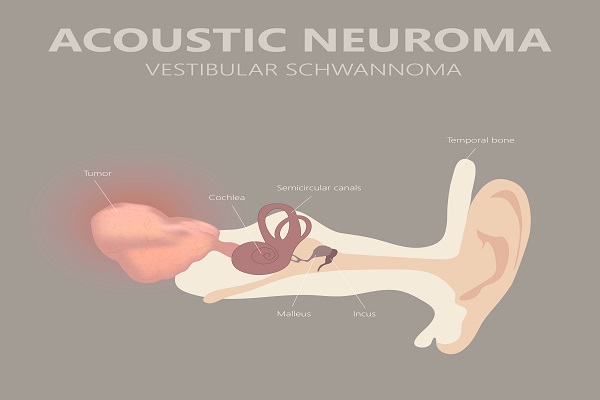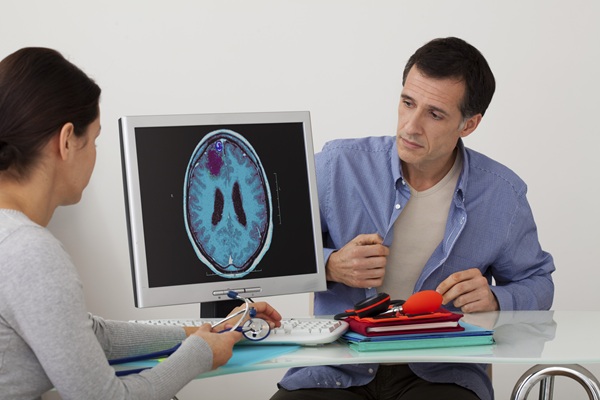How Serious Is an Acoustic Neuroma

As it is, acoustic neuroma should not be fatal. This non-cancerous and slow-growing tumor develops in the vestibular nerve from the inner ear to the brain. It usually develops from the Schwann cells that cover the main nerve and grows slowly or sometimes, not at all. However, on the rare occasion that the tumor grows and becomes large enough to press against the brain, it will interfere with a person’s vital functions.
The growth of the acoustic neuroma
Acoustic neuroma grows at an average of 1.5 millimeters per year. Many studies also suggest that these tumors can show little or no growth at all for 10 years. When the acoustic neuroma does not grow, there is no reason for the patient to panic and have it removed. Doctors would suggest monitoring the growth of the tumor.
On rare occasions, an acoustic neuroma can grow rapidly. Often, this growth is without reason. There are no dietary or environmental factors found to affect the growth of an acoustic neuroma. When the tumor does grow, the doctors will suggest invasive or non-invasive procedures or therapies.
The only reason for the growth of an acoustic neuroma is the failure of the “governor” gene to suppress the growth of the Schwann cells. These cells coat the fibers with insulation that slow down the growth of the tumor. If the gene fails, the cells will most likely increase. Sometimes, this can trigger the neuroma to double in size within six months to a year.
What happens when the acoustic neuroma grows?
Most acoustic neuromas are not dangerous or fatal because, as non-cancerous cells, they do not invade and destroy tissues. However, the cells can still cause discomfort and some conditions on the patients if they go through a period of rapid growth. The acoustic neuroma can push against the surrounding structures and affect the movement of the facial muscles. If the tumor gets larger, it can also affect swallowing, eye movement, and speaking.
Early and advanced symptoms of acoustic neuroma
But even with smaller tumors, an acoustic neuroma can still cause hearing loss and balance function problems. In fact, impaired hearing is one of the early symptoms of acoustic neuroma. People usually confuse this symptom with other disorders, not knowing that it could be a cause of acoustic neuroma. Other early symptoms are as follows:
- Ringing or buzzing in the ear
- Difficulties with balance
- Facial numbness
- A feeling of fullness in the affected ear
While other disorders can also cause these early symptoms, patients should consult doctors when they experience one or more of these symptoms. Patients should not wait for more advanced symptoms to start to appear. Among the many advanced symptoms of acoustic neuroma are headache, facial twitches, and double vision. Difficulty in swallowing and pain in the face are also considered advanced symptoms.
Consult with a doctor
Despite being benign, you should not neglect the symptoms of acoustic neuroma. It can still be fatal when left untreated because, although rare, the possibility of it growing is still there. Doctors will suggest regular tests to observe the growth of the tumor. This way, you can choose to remove it surgically or via radiation therapy once it starts to grow.
Get more information here: https://arizonaneurosurgeon.com or call Randall Porter, M.D. at (602) 603-8951
Check out what others are saying about our services on Yelp: Acoustic Neuroma in Phoenix, AZ.
Recent Posts
Brain metastases are a serious medical condition where cancer cells spread from a primary tumor to the brain. They are more common than primary brain cancer tumors and can indicate an advanced stage of systemic cancer. This condition can significantly affect your quality of life and requires professional diagnosis and treatment.Brain metastases occur when cancer…
Facial reanimation is a specialized surgical approach designed to restore movement and expression in individuals affected by facial paralysis. This condition may result from trauma, nerve injury, tumor removal, or conditions such as Bell’s palsy. Facial reanimation combines microsurgical techniques, nerve grafting, and muscle transfers to improve function and appearance. When performed by a skilled…
Brain surgery is a complex and delicate procedure. It requires strict aftercare to ensure optimal recovery and few complications. Following the advice of your brain surgeon can help aid your healing process and make your long-term treatment a success. Here are some general tips from Randall Porter, M.D. team to help patients and their caregivers…
Considering undergoing back pain treatment from an experienced chiropractor? There are many different types of back pain one can experience. There are also many different types of back pain treatments available from a chiropractor. While back pain is more common as one gets older, anyone can experience back pain. The most common cause of back pain…


